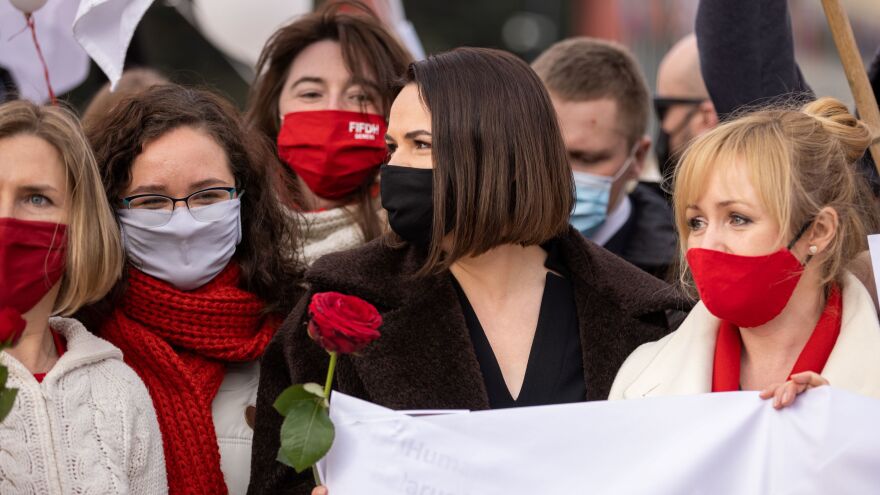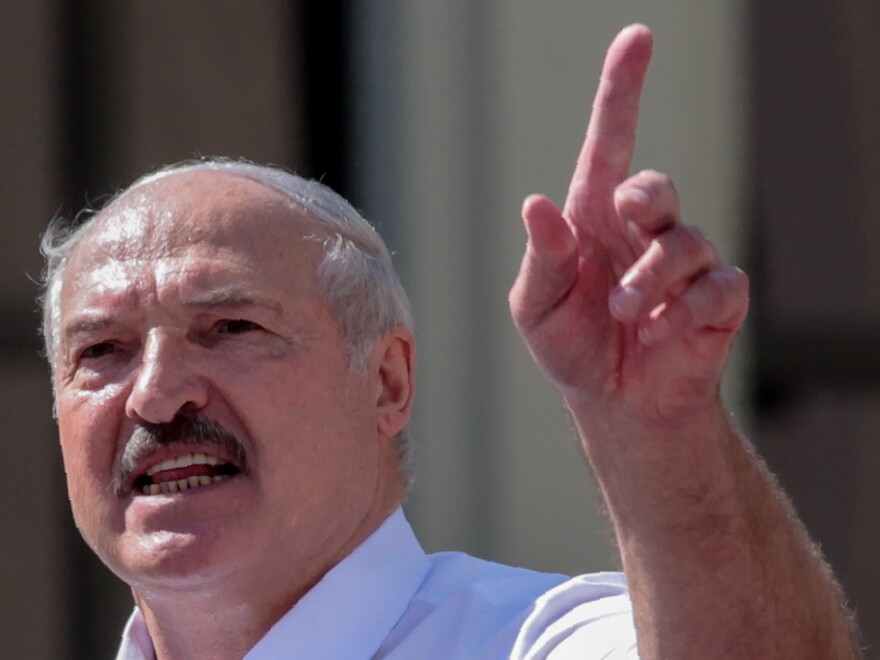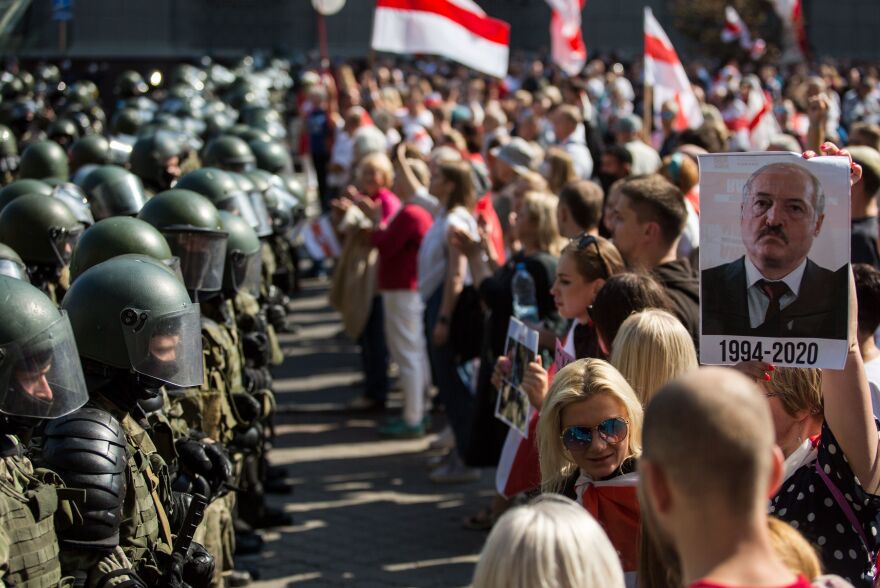MOSCOW — Svetlana Tikhanovskaya, the exiled leader of Belarus' pro-democracy movement, is calling on Belarusians to take to the streets this week and revive the mass protests that swept the Eastern European country last fall.
"I know that the Belarusian people are not giving up. They have this inner demand for demonstrations because they want to build a new country. They want new elections," she tells NPR in a phone interview from Lithuania. "This is the beginning of a second wave of protests."
In August, Belarus' leader Alexander Lukashenko, who refers to himself as Europe's "last dictator," declared himself the winner over Tikhanovskaya in a presidential election — and forced her out of the country. As a candidate, Tikhanovskaya had energized Belarusians after 24 years of one man's rule. Lukashenko's return to a sixth term in office set off months of street protests, which the regime met with a violent police crackdown.
For now, Lukashenko has prevailed, relying on the support of Russian President Vladimir Putin. The United States and the European Union have refused to recognize Lukashenko as Belarus' legitimate leader and slapped sanctions on his inner circle.
Tikhanovskaya says that renewed street protests, combined with diplomatic pressure from the West, will force Lukashenko into agreeing to a peaceful political transition and new, free and fair elections.
Calling herself the "leader of democratic Belarus," Tikhanovskaya has been crisscrossing Europe from Portugal to Finland in an effort to keep her country on the agenda of European leaders.

Now she is setting her sights on a trip to Washington, including a visit with President Biden, who as a candidate voiced support for Tikhanovskaya.
"The United States, as one of the oldest democracies in the world, should support the values of human rights, free elections and freedom of assembly," she says. "These are the things that Belarusians have been completely deprived of."
Opponents of the Belarusian regime were frustrated with the Trump administration's tepid response to the pro-democracy protests and the repressions that followed them.
Half a year before Belarus' disputed election, Mike Pompeo became the first secretary of state to visit the country since 1994. Lukashenko, always maneuvering between the West and Russia, seemed to be drifting away from Putin's grip, and the Trump administration seized an opportunity to revive diplomatic relations.
The Senate has confirmed career diplomat Julie Fisher as the first U.S. ambassador to Belarus in more than a decade, though she still hasn't taken up her post in the Belarusian capital, Minsk. Tikhanovskaya, who met with Fisher in Lithuania last month, says she would welcome the ambassador's presence in Minsk, as long she can carry out her functions without presenting her credentials to Lukashenko. The State Department says it's in a "multistep process" to send Fisher to Belarus "as soon as possible."
That process may be complicated by the State Department's sanctioning of 43 Belarusian officials for "undermining democracy" in February. But Tikhanovskaya says Western blacklists should include even more low-ranking officials so that judges and police officers think twice before carrying out repressions.

Last month, the United Nations human rights high commissioner, Michelle Bachelet, said that Belarus has been facing "a human rights crisis of unprecedented dimension."
Tikhanovskaya and her team have been closely documenting human rights abuses from the Lithuanian capital of Vilnius, just 100 miles from Minsk. According to Tikhanovskaya, there are 290 political prisoners in Belarus, including her husband, and more than 2,500 activists, protesters and journalists face criminal charges.
Despite her physical proximity to Belarus, Tikhanovskaya says she personally feels safe. The Lithuanian government said earlier this month that it "would rather watch hell freeze over" than consider a Belarusian request to extradite her on charges of endangering public order.
Less than a year ago, Tikhanovskaya had no interest in becoming a politician. But when her husband, Sergei Tikhanovsky, was barred from running against Lukashenko and jailed, Tikhanovskaya stepped up to become the opposition's main candidate. After the election, she was pressured to leave for Vilnius, where she joined her two children.
Tikhanovskaya says the last time she heard her husband on the phone was in October — for 10 minutes. She says she tries to shield her children from what she calls "grown-up problems" and that her 5-year-old daughter still thinks her dad is just on a very long business trip.
"Even for a professional politician, it would be a challenge. And she's been taking this challenge with so much grace, so much confidence and so much skill," says Valery Kavaleuski, a former Belarusian diplomat and Georgetown graduate who left a job at the World Bank to join Tikhanovskaya's team.
"She has revealed a lot of potential in her: a lot of energy, a lot of power, a lot of persistence," Kavaleuski says. "Svetlana proves that there is so much in each and every one of us that we are capable of — much more than we would expect of ourselves."
Still, Lukashenko has managed to keep the upper hand, driving protesters from the streets with the use of force and intimidation. By calling on Belarusians to renew their protests on March 25 — unofficially known as Freedom Day in Belarus — Tikhanovskaya is trying to seize back the initiative.

Artyom Shraibman, a political analyst in Minsk, says Tikhanovskaya and her supporters have very few options, but cautions against expecting a "political earthquake."
"People are scared. Most active protesters have either left or been jailed," he says. "Many have been disillusioned. They've been frustrated by the lack of a quick victory."
"Such regimes as the Belarusian regime do not fall that easily, just because of the moral pressure of hundreds of thousands of people," Shraibman says.
Tikhanovskaya is not listening to naysayers. Her timeline calls for talks with Lukashenko to start in May and elections to be held by the end of October.
The regime is showing no signs of giving in, though. At drills to practice dispersing rallies last week, the commander of the Internal Ministry troops, Nikolai Karpenkov warned protesters.
"These are absolutely the enemies of our state, and we will deal with them very quickly. We'll try to make preventive arrests, so they don't even try to come out," he said. If they do, he added, his forces would repeat last year's crackdown "with great pleasure."
Police arrested a dozen activists and conducted raids on other regime opponents across Belarus Wednesday, according to the Minsk-based human rights group Viasna.
Tikhanovskaya is unfazed by the threats.
"Lukashenko can't change people's minds with truncheons and guns," she says. "You can't force people to love a dictator, and that's why people will take to the streets."
Copyright 2023 NPR. To see more, visit https://www.npr.org.



